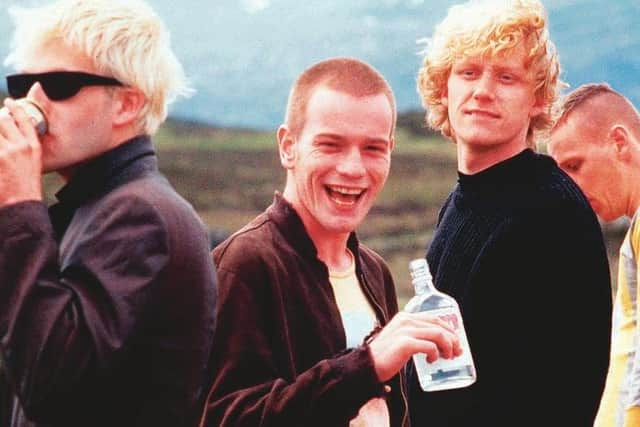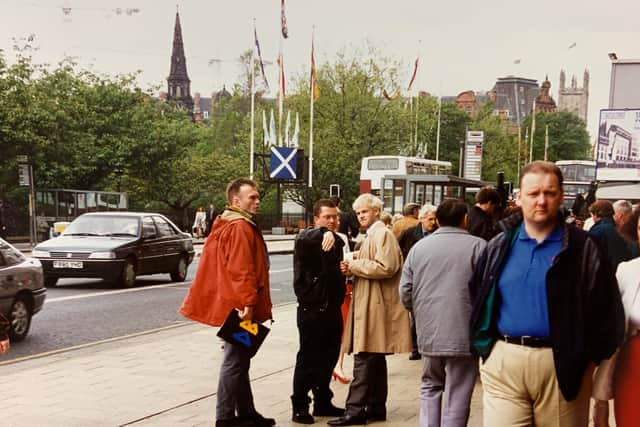Trainspotting at 25: 'It felt like an explosion of fireworks on a dull, grey sky when it arrived'
A quarter of a century after Trainspotting arrived in cinemas, its influence is still strongly felt, from the streets of Leith to Scotland’s film festivals. It is still regularly voted one of the best British films of all-time.
Released during a mid-1990s golden age for Scottish cinema, just months after Braveheart, Trainspotting was unlike anything that had been seen on screen before.
Advertisement
Hide AdAdvertisement
Hide AdLaunched with multiple premieres on the one night in Edinburgh and Glasgow, and a star-studded party in Cannes, its impact on Scottish culture has certainly not been surpassed since.
Although it will forever be linked to the Cool Britannia era of mid-1990s culture in the UK – partly thanks to the presence of Britpop bands like Pulp, Blur, Elastica and Sleeper on its soundtrack – its origins were in the late 1980s and early 1990s underground rave and publishing scenes in Edinburgh.
Leith-born Irvine Welsh drew on his experiences of being brought up in the Muirhouse estate for Trainspotting, extracts of which were published in the magazine Rebel Inc, before the book was released to critical acclaim and huge word-of-mouth buzz in 1993.
Less than two years later, an Edinburgh-set thriller, Shallow Grave, announced the arrival of new British director Danny Boyle, producer Andrew Macdonald, screenwriter John Hodge and Scottish star Ewan McGregor. All four were to reunite for Trainspotting, along Ewen Bremner, who had starred in the stage adaptation of Welsh’s book, Jonny Lee Miller, Kevin McKidd, Robert Carlyle and Kelly Macdonald, a total newcomer who had an answered an advert for a open casting session. The success of the book and Shallow Grave, combined with a striking poster campaign, meant expectations were sky high.
Allan Hunter, film critic and co-director of the Glasgow Film Festival, recalled: “Trainspotting felt like an explosion of fireworks on a dull grey sky when it arrived.
"Danny Boyle’s bravura direction brings such energy and drive to the story. It made British films (and Scottish films) seem cool. The marketing was so slick and unforgettable. It became the film that everyone wanted to be associated with.
“It really was a hurricane that blew all the cobwebs away and it became a symbol of social and political change in a country heading towards the election of Tony Blair and the giddy days of Cool Britannia.”
Advertisement
Hide AdAdvertisement
Hide AdFilmmaker Mark Cousins, director of the Edinburgh International Film Festival from 1996-97, said: “It felt that a spotlight was put on Edinburgh.
"People knew that the city was cultured, beautiful, and a place of festivals, but we were seen as a bit Brigadoon – sleepy then bursting into life in August.


“Trainspotting was hyper, local, fizzy and surreal. It made me feel young, cinematic and dangerous.”
In Edinburgh, feelings about the film were mixed. While cinemas like the Cameo and Filmhouse were packed out for weeks, politicians were conscious that the film was throwing a spotlight on a darker side of the city.
Long-time Muirhouse councillor Lesley Hinds, leader of Edinburgh District Council when the film was released, recalled: “Trainspotting was ground-breaking in its gritty portrayal of drug addiction, unemployment and poverty in Edinburgh. It was a side of Edinburgh which many people who lived in the city did not know existed, never mind tourists.
“I don’t think it harmed the city’s reputation as a whole but some people who lived in the areas portrayed in the film, like Muirhouse, felt they, and where they lived, were stigmatised.


“The film showed how drugs and HIV had an effect on not just the individuals, but working class families.
Advertisement
Hide AdAdvertisement
Hide Ad“Because it was a realistic portrayal, greater investment in housing and drug support groups was delivered in Muirhouse following the film.”
Gordon Munro, a Leith councillor since 2003, said: “When the film came out the consensus was that only Spud looked like he came from Leith.
“There was some real outrage that so little of it was in Edinburgh, and even less of Hibs, but overall it got across the vibe of the book and the very dark humour behind some of the writing.
"Edinburgh came across as cooler, especially to those outside the city, with a soundtrack that helped that image and probably helped expand the student population.”
Trainspotting’s impact was felt much further afield than Edinburgh though – especially in the film industry. Cousins said: “It was – it has to be said – a shot in the arm for the UK and Scottish film industries. It was a kind of musical without dance routines, and reminded the industry that as well as being true or good, a film could be exciting.”


Hunter added: “Following on so quickly from Braveheart, it felt that Trainspotting helped cement the case for Scotland as a filmmaking country that deserved global attention. It certainly felt at the time as if everyone was excited about what might be possible.
"Might we dare to dream of a Scottish film studio? What investment in Scottish production could follow? It raised a lot of hopes and dreams for many people."Whether any of them translated into a lasting legacy for Scottish filmmaking is another matter.”
Advertisement
Hide AdAdvertisement
Hide AdAlthough only the famous opening sequence of Trainspotting was filmed in Edinburgh, experts believe the film has proved crucial in attracting other productions to the city.
Rosie Ellison, manager of the Film Edinburgh commission, previously known as the Edinburgh Film Office, said: “Trainspotting was one of the first feature films that the Edinburgh Film Office assisted, back in 1995, supporting the unforgettable opening sequence of the film.
"Now, 25 years after its release, Trainspotting still brings international travel and cultural TV shows to Edinburgh on a regular basis, putting the city on the screen around the world in the context of a youthful, vibrant, sometimes edgy, sometimes cool place to visit.
"It’s a wonderful contrast to the Edinburgh portrayed by The Prime of Miss Jean Brodie or Chariots of Fire, or indeed Sunshine On Leith or Avengers: Infinity War.”
It would have been unthinkable when Trainspotting was released that it would inspire visitors to visit Scotland.
However researched published five years ago, in the run-up to the release of the long-awaited sequel T2, found that it was one of the most common cinematic inspirations for booking a trip to Scotland, along with Highlander, Braveheart, Rob Roy and the Harry Potter movies.
More recently, VisitScotland has even used the book and film as hook for a visit to Leith, recommending Tim Bell’s long-running Trainspotting tours and telling potential visitors: “The old seaport has had a far ranging facelift and now offers a fine range of eating and drinking venues as well as quality shopping.”
Advertisement
Hide AdAdvertisement
Hide AdJenni Steele, film and creative industries manager at VisitScotland, said: “Films, television series and books are huge motivators for visitors to come to Scotland, whether it be to see the locations or explore our heritage and culture, and Trainspotting is no exception.
"The Danny Boyle film, and Irvine Welsh’s original novel, are still referenced by visitors in our travel surveys, showing the long-term effects these milestones in Scottish popular culture have had on the world.”
A quarter of a century on, Scotland is still waiting for another cultural moment to rival Trainspotting, on the page or on the big screen.
Writer and broadcaster Stuart Cosgrove said: “Trainspotting is a huge milestone in both film and literary history.
"It demonstrated that Scottish stories could be seen and read around the world.
“As for the book and Irvine's subsequent books, they had one huge impact – they allowed working class people, especially young men, to see their world and subcultures reflected in print - it was a huge moment.”
Hunter added: “It is hard to think of anything that has matched the impact of Trainspotting in Scotland or the UK film industry as a whole.
Advertisement
Hide AdAdvertisement
Hide Ad“It was an event that captured the energy and hope of a particular moment in a way that the whole world wanted to embrace. Something like that just doesn’t come along very often.”
A message from the Editor:
Thank you for reading this article. We're more reliant on your support than ever as the shift in consumer habits brought about by coronavirus impacts our advertisers.
If you haven't already, please consider supporting our trusted, fact-checked journalism by taking out a digital subscription.
Joy Yates
Editorial Director
Comments
Want to join the conversation? Please or to comment on this article.